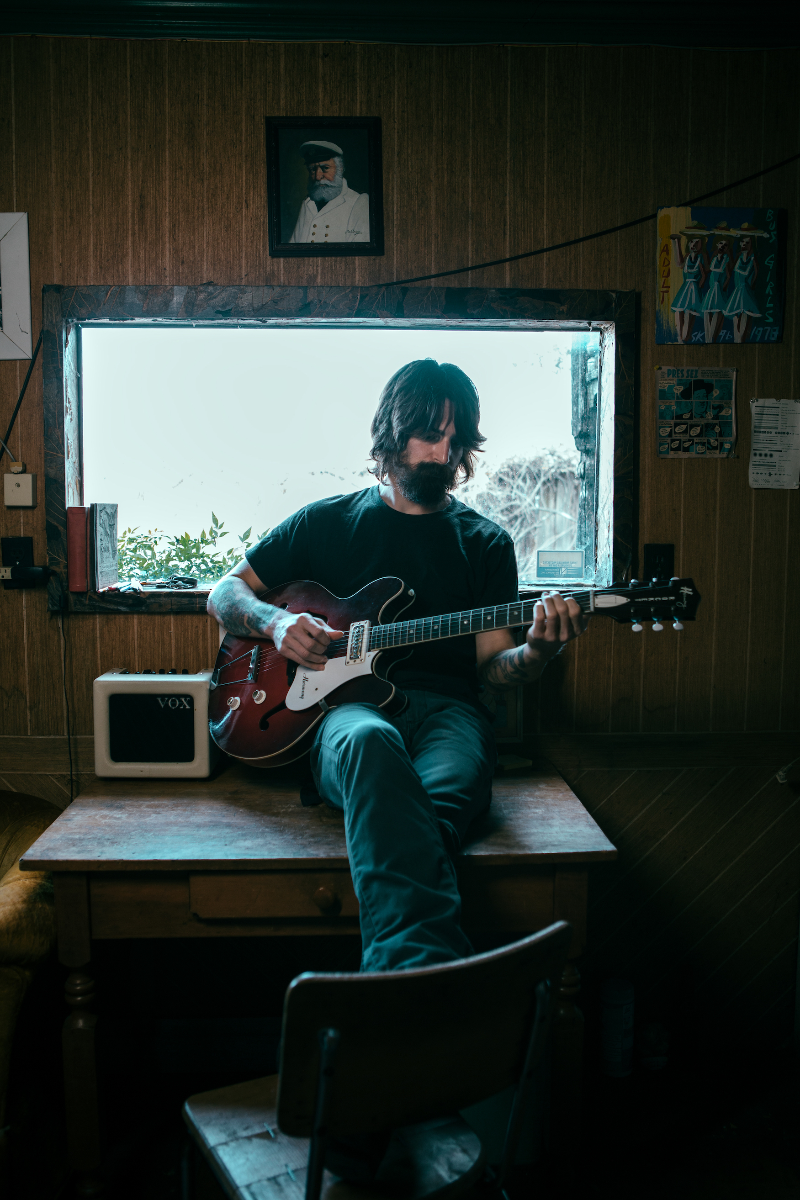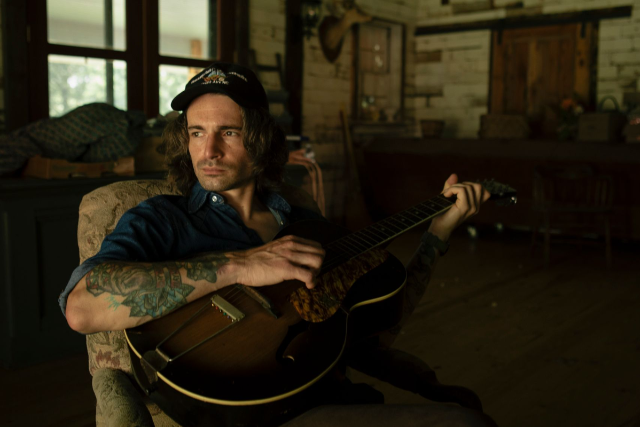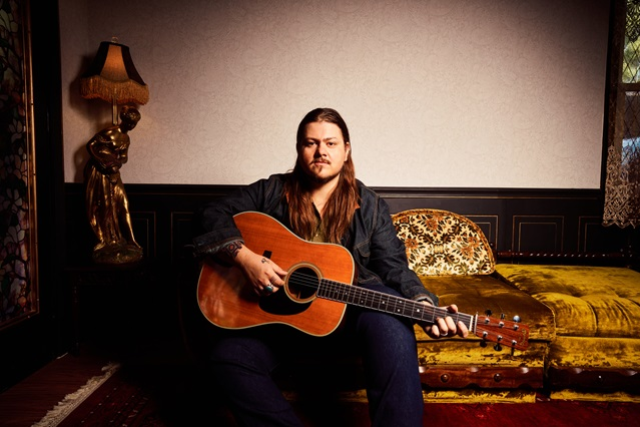The Southgate House Revival - Sanctuary
Tue
May 24, 2022
8:00 pm
(7:00 pm DOORS)
John R. Miller + Vincent Neil Emerson
$20 adv/$25 dos

In accordance with CDC guidelines, and so that we may all enjoy live music, masks are strongly recommended when attending events at SGHR. COVID protocols will be in place.
John R Miller is a true hyphenate artist: singer-songwriter-picker. Every song on his thrilling debut solo album, Depreciated, is lush with intricate wordplay and haunting imagery, as well as being backed by a band that is on fire. One of his biggest long-time fans is roots music favorite Tyler Childers, who says he's "a well-travelled wordsmith mapping out the world he's seen, three chords at a time." Miller is somehow able to transport us to a shadowy honkytonk and get existential all in the same line with his tightly written compositions. Miller's own guitar-playing is on fine display here along with vocals that evoke the white-waters of the Potomac River rumbling below the high ridges of his native Shenandoah Valley.
Vincent Neil Emerson is a torchbearer of the Texas songwriter tradition. He channels the straightforward truth-telling and resonance of his songwriting heroes in Townes Van Zandt, Guy Clark, and Steve Earle into something fresh and distinctly his own. Where his 2019 debut Fried Chicken and Evil Women proved himself as one of the most reverent students of country and western musical traditions, his follow-up LP, the masterful Rodney Crowell-produced Vincent Neil Emerson, which is out June 25 via La Honda Records/Thirty Tigers, is a brave step forward that solidifies his place as one of music's most compelling and emotionally clarifying storytellers. His songs are cathartic and bluntly honest, never mincing words or dancing around uncomfortable truths.
John R Miller is a true hyphenate artist: singer-songwriter-picker. Every song on his thrilling debut solo album, Depreciated, is lush with intricate wordplay and haunting imagery, as well as being backed by a band that is on fire. One of his biggest long-time fans is roots music favorite Tyler Childers, who says he's "a well-travelled wordsmith mapping out the world he's seen, three chords at a time." Miller is somehow able to transport us to a shadowy honkytonk and get existential all in the same line with his tightly written compositions. Miller's own guitar-playing is on fine display here along with vocals that evoke the white-waters of the Potomac River rumbling below the high ridges of his native Shenandoah Valley.
Vincent Neil Emerson is a torchbearer of the Texas songwriter tradition. He channels the straightforward truth-telling and resonance of his songwriting heroes in Townes Van Zandt, Guy Clark, and Steve Earle into something fresh and distinctly his own. Where his 2019 debut Fried Chicken and Evil Women proved himself as one of the most reverent students of country and western musical traditions, his follow-up LP, the masterful Rodney Crowell-produced Vincent Neil Emerson, which is out June 25 via La Honda Records/Thirty Tigers, is a brave step forward that solidifies his place as one of music's most compelling and emotionally clarifying storytellers. His songs are cathartic and bluntly honest, never mincing words or dancing around uncomfortable truths.

|
John R. Miller
|
|
John R Miller is a true hyphenate artist: singer-songwriter-picker. Every song on his thrilling debut solo album, Depreciated, is lush with intricate wordplay and haunting imagery, as well as being backed by a band that is on fire. One of his biggest long-time fans is roots music favorite Tyler Childers, who says he's "a well-travelled wordsmith mapping out the world he's seen, three chords at a time." Miller is somehow able to transport us to a shadowy honkytonk and get existential all in the same line with his tightly written compositions. Miller's own guitar-playing is on fine display here along with vocals that evoke the white-waters of the Potomac River rumbling below the high ridges of his native Shenandoah Valley. Depreciated is a collection of eleven gems that take us to his homeplace even while exploring the way we can't go home again, no matter how much we might ache for it. On the album, Miller says he was eager to combine elements of country, folk, blues, and rock to make his own sound. Recently lost heroes like Prine, Walker, and Shaver served as guideposts for the songcrafting but Miller has completely achieved his own sound. The album is almost novelistic in its journey, not only to the complicated relationship Miller has with the Shenandoah Valley but also into the mind of someone going through transitions. "I wrote most of these songs after finding myself single and without a band for the first time in a long while," Miller says. "I stumbled to Nashville and started to figure things out, so a lot of these have the feel of closing a chapter." Miller grew up in the Eastern Panhandle of West Virginia near the Potomac River. "There are three or four little towns I know well that make up the region," he says, name-checking places like Martinsburg, Shepherdstown, Hedgesville, and Keyes Gap. "It's a haunted place. In some ways it's frozen in time. So much old stuff has lingered there, and its history is still very present." As much as Miller loves where he's from, he's always had a complicated relationship with home and never could figure out what to do with himself there. "I just wanted to make music, and there's no real infrastructure for that there. We had to travel to play regularly and as teenagers most of our gigs were spent playing in old church halls or Ruritan Clubs." He was raised "kinda sorta Catholic" and although he gave up on that as a teenager, he says "it follows me everywhere, still." His family was not musical -- his father worked odd jobs and was a paramedic before Miller was born, while his mother was a nurse -- but he was drawn to music at an early age, which was essential to him since he says school was "an exercise in patience" for him. "Music was the first thing to turn my brain on. I'd sit by the stereo for hours with a blank audio cassette waiting to record songs I liked," he says. "I was into a lot of whatever was on the radio until I was in middle school and started finding out about punk music, which is what I gravitated toward and tried to play through high school." Not long after a short and aimless attempt at college, I was introduced to old time and traditional fiddle music, particularly around West Virginia, and my whole musical world started to open up." Around the same time he discovered John Prine and says the music of Steve Earle sent him "down a rabbit hole." From there he found the 1970s Texas gods like Guy Clark, Townes Van Zandt, Jerry Jeff Walker, Billy Joe Shaver, and Blaze Foley, the swamp pop of Bobby Charles, and the Tulsa Sound of J.J. Cale, who is probably his biggest influence. As much as the music buoyed him, it also took its toll. "I always prioritized being a touring musician above everything, and my attempts at relationships suffered for it," he says. Miller was also often fighting depression and watching many of his friends "go off the rails on occasion." He says that for a long period he did a lot of self-medicating. "I used to go about it by drinking vodka from morning to night for months on end," he says. "I shouldn't have made it this far. I'm lucky, I think." Ultimately, the music won out and Depreciated is the hard-won result of years of self-education provided by life experiences that included arrests, a drunken knife-throwing incident, relationships both lost and long-term, and learning from the best of the singer-songwriters by listening. For the creation of the album Miller joined forces with two producers who shared his vision for a country-blues infused record: multiple Grammy nominee Justin Francis, who has worked with everyone from Leon Bridges to Kacey Musgraves, and Adam Meisterhans, a renowned guitarist whom Miller has known since their days as roustabout musicians in West Virginia. They recorded Depreciated in the legendary Studio A of Sound Emporium in Nashville. Miller says the studio's "killer gear and lived-in feeling" enhanced the sound but most importantly it provided plenty of space for the band to be together. "It's important to me to have a relationship with the people I'm working with," Miller says. The crew is a well-oiled machine that is given the opportunity to shine throughout the album: Meisterhans adding guitar along with Miller, Francis bringing in congas and Wurlitzer, Chloe Edmonstone offering a plaintive fiddle, John Looney on mandolin, Jonathan Beam providing bass, Russ Pahl's shimmery pedal steel, John Clay on drums, and Robbie Crowell playing the Wurlie and Hammond B3. We're driven into Miller's world by steady drums, a thudding bass, and steering electric guitar in "Lookin' Over My Shoulder," a song that perfectly captures going back to your old haunts after a breakup. Right away the many layers -- sonic and thematic -- are revealed as we continue on into "Borrowed Time," a song that feels like a smoky bar-room but is also Miller at his most profound, pondering about "listening to that eternal engine whine." Its ghostly electric guitar and percussion begs for two-steppers. More variety kicks in with "Faustina," a lovely prayer to the most recent saint that shows Miller in seeker mode. "Shenandoah Shakedown" is a four-minute epic with its river that "speaks in tongues" and a "sky frozen black" but also intimate in its exploration of a relationship crumbling. "Coming Down" is perhaps the thematic heart of the album, asking "Don't you wish you could go back home?" and exploring that question in elegiac tones with stand-out harmonies between Miller and Edmonstone. The breakup is further explored in the deceptively lively "Old Dance Floor," which is answered in the keep-your-head-up anthem of "Motor's Fried" before the intricate character study of a woman who "grew up too fast in the moonlight" in "Back and Forth," which features memorable turns on the fiddle and mandolin. There's the calming instrumental track "What's Left of the Valley" that is an elegy for a region, an ode to searching for used cars called "Half Ton Van," and finally, the melodic mastery of "Fire Dancer," which may be the most complex and psychedelically-influenced track on the album that allows the album to land on a place of self-acceptance, with a narrator ready to go forward stronger and wiser. The eleven songs, all penned by Miller, provide an album that stands strong as an entity but also provides tight singles that announce a major new voice. Miller possesses a rich voice, a flair for leading a band, and perhaps most of all, a startling ability for songwriting that results in Depreciated being an album that will have widespread appeal. Miller has achieved that most difficult yet most important thing: presenting the universal in the specific, paying attention to the cool beneath the pines along the rivers of the Shenandoah Valley while also pulling the camera back to reveal the longings that unite us all. -- Silas House |
|

|
Vincent Neil Emerson
|
|
Vincent Neil Emerson is a torchbearer of the Texas songwriter tradition. He channels the straightforward truth-telling and resonance of his songwriting heroes in Townes Van Zandt, Guy Clark, and Steve Earle into something fresh and distinctly his own. Where his 2019 debut Fried Chicken and Evil Women proved himself as one of the most reverent students of country and western musical traditions, his follow-up LP, the masterful Rodney Crowell-produced Vincent Neil Emerson, which is out June 25 via La Honda Records/Thirty Tigers, is a brave step forward that solidifies his place as one of music's most compelling and emotionally clarifying storytellers. His songs are cathartic and bluntly honest, never mincing words or dancing around uncomfortable truths. Raised in Van Zandt County in East Texas by a single mother of Choctaw-Apache descent, Emerson's world changed when he first heard Townes Van Zandt's music. "To hear a guy from Fort Worth say those kinds of things and make those songs was pretty eye opening," the now 29-year-old songwriter says. "I had never heard songwriting like that before." He's spent the better part of the past decade honing his songwriting and performance chops playing bars, honky-tonks, and BBQs joint across the Fort Worth area. His first album Fried Chicken and Evil Women, which he wrote in his mid-twenties and came out on La Honda Records, the label he cofounded that now includes a roster of Colter Wall, Local Honeys, and Riddy Arman, is a snapshot of his growth as a songwriter and stage-tested charm with songs like "Willie Nelson's Wall" and "25 and Wastin' Time" expertly combining humor and tragedy. These marathon gigs and the undeniable songs on his debut introduced Emerson to Canadian songwriter Colter Wall, who quickly became a close friend and took him on tour. With Wall's audience and sold-out theater shows on runs with Charley Crockett, Turnpike Troubadours, and many others, Emerson found his niche. "It took a guy from Canada bringing me on tour for people to actually start paying attention," says Emerson. "Before that it was a grind like anything else just trying to make a living." Crockett is another staunch early supporter of Emerson's and covered Fried Chicken highlight "7 Come 11" on his 2019 LP The Valley. Like every working musician, 2020 pulled the rug out from under Emerson. With the pandemic shuttering live music and cancelling promising tours, he processed the upheaval the only way he knew how: by writing his ass off. "At the beginning of quarantine, I was really frustrated with everything else going on," says Emerson. "Everything was falling apart around me, and I didn't know what to do." He took to his writing shed and came up with the single "High On Getting By," a gorgeous song full of self-reflection and resilience: the most autobiographical thing he's ever written. He sings, "I got my first child on the way / And the bills are all unpaid / I should have finished high school / Got a job and learned to save / But the words keep on fallin' / And the highway keeps on callin' / To my pen." That song proved to be a turning point for Emerson. "After I wrote it, the floodgates opened up for me in my songwriting and emotionally," he says. "Songwriting has always been a therapeutic thing for me. So, I just started writing more from the heart." Allowing himself to be open and reveal some of the most intimate details of his life was a scary yet freeing prospect for Emerson, especially on the raw and devastating "Learnin' To Drown," which addresses his father's suicide. "I've been trying to write a song about my father's passing for a while," he says. "I was just having a hard time processing that emotionally. Before I was always trying to find a way to kind of dance around it and not really give too much away. But there's no beating around the bush here." He sings, "Well there ain't much that lasts too long / All the rights that I took wrong / All the lefts that still ain't gone / They will be here / Here in my sad bastard song." Elsewhere, on "The Ballad of the Choctaw-Apache," he sings of how in the 1960s the Choctaw-Apache tribe of Sabine Parish was forced to sell "180,000 acres of ancestral land" to the government, uprooting them from their home. Emerson pulls no punches in his narration of the historic injustice, channeling the essence of traditional folk songs. He sings, "Well you take away their home / And you claim what you don't own/ Well I guess it's just the American way." Emerson explains the track: "This happened not too long ago and it affected my grandparents and my family directly. I've always strayed away from trying to write political songs, but this is more about human rights. For those people who were stripped of their land like that, it's still tough." His intense and productive writing sessions produced 10 finished songs over the course of just a couple of months, a body of work so personal that he knew he would have to name the final product Vincent Neil Emerson. These demos caught the attention of Texas country icon Rodney Crowell, who signed on to produce and record the LP. "Rodney is a hero of mine," says Emerson. "He wanted to make something that serves the songs, as opposed to making a record trying to put focus on production or the playing. It was an honor to work with him." Crowell had similar high praise for Emerson: "If he grows on the public the way he's grown on me, it's possible young Vincent will plant the flag of his [songwriting] forebears firmly in the consciousness of a whole new generation." At the studio, Emerson tracked the songs with a crack team of session players. "Because of them, we were able to get those songs in one take," he says. You can hear that no-frills approach on the barnstorming "High on the Mountain," a bluegrass tune that highlights Emerson's versatility as a performer and depth as a lyricist. On first listen, the track opens with upbeat fiddles and blistering guitar feels, but Emerson's voice achingly sings of heartbreak, loss, and irrevocable change: "I pulled into Austin / 'Cause Fort Worth ain't the same." Opener "Texas Moon" grapples with home after so many days away on tour: "I been missin' home / But I just can't ever stay / Well it don't feel like ramblin' / 'Til ya take it day by day." Emerson is never overly sentimental and across this album, he makes a point to just say how he feels in the most straightforward and real way he can. "I think I've always gravitated towards artists that are honest about what they're doing." says Emerson. "It's the most important thing because people have a chance to connect to a little more if you're telling the truth." |
|
